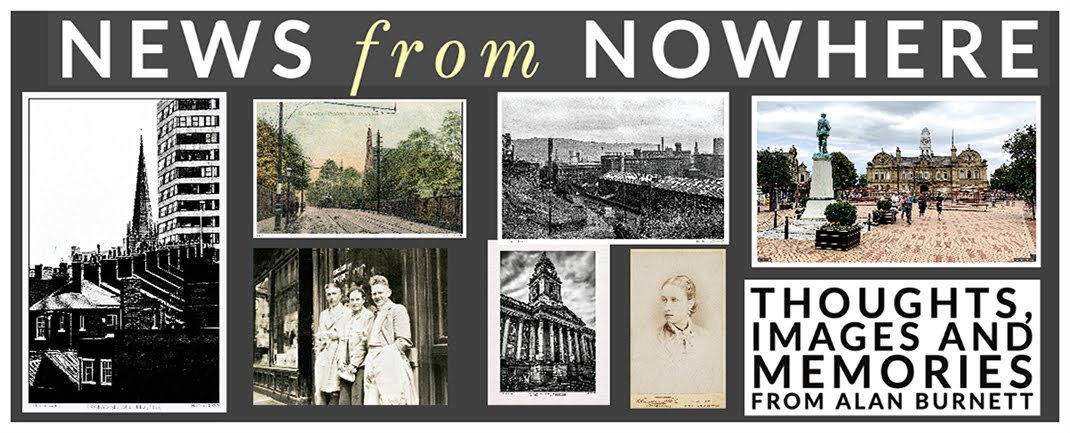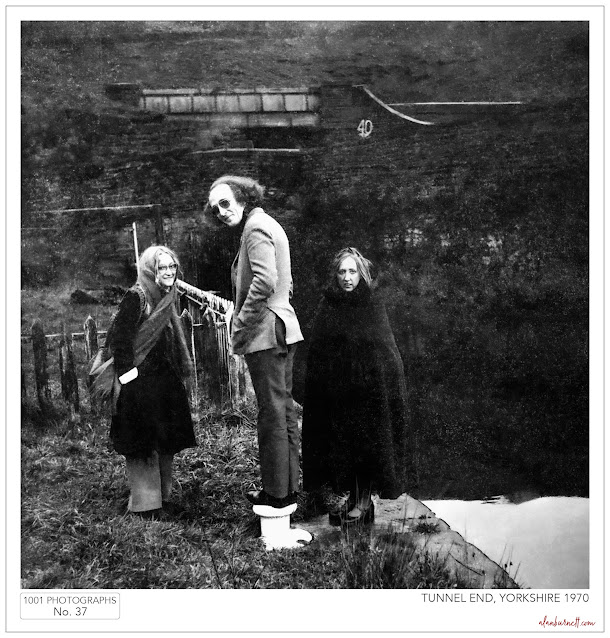I have been meaning to have a go at Willow's wonderful Magpie Tales for weeks and weeks. But something has always got in the way and prevented me. This, of course, is a lie : it is just that I have never been able to work up the necessary courage. Looks like I've finally run out of excuses.
Alice Baines walked down Watton Street towards the factory, the clatter of her wooden-soled shoes cutting through the morning stillness with granite-like severity. She was vaguely aware of other figures making their way to Minton’s , but these early morning trips to work tended to be solitary excursions with none of the convivial fellowship of homecoming. At the end of the day the pot girls would walk together , laugh together, shout and occasionally scream together as they climbed the stone sets up Hanley Bank and headed towards the smoke-stained terraces that spread like the folds of a concertina along the Burslam Ridge. But at this early hour Alice and the dozens of other factory-bound girls tried to cling to the memory of their recently vacated beds as if the memory itself could provide comfort and protection from the biting wind that gusted down from the far off mountains.
But it wasn’t just the breeze that sent a chill down Alice’s spine that Monday morning. That Welsh-whipped wind was aided by sadness and abetted by an unwelcome familiarity with mortality. There probably comes a time in everyone’s life when the realisation that life is a finite affair dawns on them with gut-wrenching certainty. For 24 year old Alice Baines, that moment had been yesterday, Sunday 19th January 1854. The day Aunt Ruth had died. For as long as she could remember, Aunt Ruth had been a part of Alice’s life - cooking oat cakes for her Cousin Tommy and herself, sharing a glass of stout with her mother, rubbing the pain of bumps away, smoothing out the emotional care lines of life. And now Ruth was no more, snatched from life by some unspoken disease that had been cleaving its way through the narrow streets of the Potteries for much of the winter.
Alice’s sense of loss was accompanied by an even more powerful sense of shock : shock that the world could continue on as though nothing had happened. The Pot Banks could still send out their clouds of acrid smoke, the steam whistles could still split the morning mist, the carters’ horse could still spark the stone cobbles : all without the person who had been a central part of life itself. And with the shock came the realisation that at some point in the future – maybe in forty years, maybe in forty days – the same would be true of Alice herself. The world would go on without her and the evidence of her very existence would quickly vanish like condensing steam. No religious education had prepared her for this rendezvous with mortality. No Sunday School teacher, no circuit preacher, no travelling evangelist had offered an explanation. Alice wanted to know what would live on when she, like Aunt Ruth, had gone. Nobody could tell her.
Such thoughts accompanied Alice through the brick arch entrance to Mintons’ Factory. They walked with her down the stone floored corridor that led to the Transfer Room. They occupied her senses as she took her place amongst the long row of girls who attached the printed transfers to the white china plates and with practiced skill brushed on the dark blue paint to form the highlights of the traditional willow pattern.
“Alice Baines, look what tha doing lass!” The harsh voice of Josh Thurlston, the Transfer Room Overlooker broke through Alice’s morose mood. “Tha’s smudged that ‘un”, he said, picking the plate up and roughly stacking it next to the pile of seconds and rejects in the corner. “Start thinking of thy job lass, ‘stead of daydreaming, else tha’ll have no job to think of”. Alice tried her best to forget about mortality, about death and about what would live on, to cast such thoughts aside like the willow pattern plate with the smudged transfer.
* * * *
Ben headed for the exit of the Antiques Fare, satisfied with the haul he had managed to gather together. The small hall table was well made and had a pleasing patina that suggested real age rather than something sprayed from a bottle. The print might be run of the mill, but it was Victorian run of the mill, well framed and in good condition. The only thing that fell short of his usual standards was that odd little willow pattern plate, the one with the smudged transfer print. He had no idea why he had bought it. It was nothing special. It probably started life as a reject and had gone downhill ever since. But there was something about it, some life-force which had protected it down the years, saved it from the rubbish dumps and the municipal garbage piles. Something which lived on.
For more interpretations on the theme go to the Magpie Tales Blog





Oh my...you are some writer...Oh you got me right in the heart with life is a finite affair...are those your words..'cause I love them...Having thought this many times
ReplyDeleteand I loved her wondering about how life just continues on..despite our passing..and I felt her agony....this is where I knew what you were thinking!
and I was right...
a smudged plate...
which she never knew that carried her life force
We never know what we send out into the world that will survive us
Very well done story!
Nice to read such well written sentences,too, I may add!
Loved the accent..heard it loud and clear
Thank you Suz. Yours is the first comment and I have been sat here nervously thinking "I'm not sure I should have done that, I know what I was meaning but would other people follow it". You will never know the pleasure I felt when I read your comments.
ReplyDeleteI love how the pain and heart of someone in the past was able to connect to modern times. There is heart in this piece. :)
ReplyDeletesee alan..i am mad at you now...you have been selfishly keeping this kinda talent and not sharing it with us...smiles. an excellent magpie. i am so glad you joined up this week. you pay the emotions like a fine fiddle...
ReplyDeleteThank you for this is a wonderful story, Alan. The use of creativity as an expression of life which carries a portal and connection from one era to another. This is what we all are seeking, I think ... a way to leave something of value of ourselves, our essence, our presence. I love the way you wove a connection between Alice and Ben that was unbounded by time and space. I think I love things even more when they have some small flaw or smudge.
ReplyDeleteProof, if proof was needed, that you have a way with words, Alan. This is just my 'cup of tea', a simple tale that carries real weight.
ReplyDeleteSuz is right when she says, "..We never know what we send out into the world that will survive us." This short tale being a prime example.
Bravo -- a well written tale with a strong message about what we value in life -- it isn't always the monetary some of the simple treasures of the heart that have the real value and meaning to us-- and lucky is the person who recognizes this as in your tale.
ReplyDeleteJoanny
Me thinks you've walked that walkway that Alice took, well described and beautiful to read.
ReplyDeleteSuch a sad story interwoven with the story the Willow plate, It sounded as though the fella that bought it values it for its self.
A good read I shall look forward to your next Magpie Tale.
Christine
Interesting piece you wrote.
ReplyDeleteAww great effort. And how sweet. I have an old teapot with a willow pattern that belonged to my Gran. I don't use it of course but it's there, sitting on the bureau and a constant reminder of her. I'm such a tosser I don't think I'll have a single legacy!
ReplyDeleteOh, wow-ee!! Alan, you popped into Magpie with a big bang! I love-love-love how you brought the history of the Minton factory into the tale and then brought it full circle with the antique fair at the end. This has a wonderful "How Green Was My Valley" feel to it.
ReplyDeleteMy favorite set of china is a vintage Burslam set, btw.
Bravo! What a heartfelt, life-affirming piece, Alan. The idea of the plate with the fault being carried through to the present (that's my favourite kind of novel with the past-present cross-over) was really inspired!
ReplyDeleteThe line about trying to recall the warm-beds really struck a chord with me. I love MY bed!
Well done, my friend! It has a bit of a Sepia Saturday feel to it.
Kat
P.S. I think I have a piece of Burslem in my collection of retro English stoneware.
What a beautiful magpie tale that captured me right from the beginning.
ReplyDeleteA wonderful, wonderful piece - finite and infinite.
ReplyDeleteI definitely spend my morning commute wishing I were still in bed (I'm NOT a morning person LOL).
ReplyDeleteI always envy people who can tell a story. I think almost anyone can write a poem (really - it doesn't even require good grammar), but a story is a whole other animal. Well done!
cool job!
ReplyDeleteReally good writing, Alan--your secret's out now. A great eye for detail & lovely descriptions--the "granite-like severity" of the wooden shoes, the terraces "like the folds of a concertina," the wonderful telling of how "life goes on."
ReplyDeleteThat was marvelous! I love how you tied the energy together between two very different people. Excellent Magging!
ReplyDeleteBeautifully told and written with a very happy ending. Hefty topics to tackle in a short story; mortality, family, death, but you did it with finesse. Great Magpie!
ReplyDeleteWe're all part of the same story, aren't we..and thanks for reminding us so elegantly!
ReplyDeleteDear Alan: Wonderful story! I thought I was reading Charles Dickens! Esquisite details, great plot and anti-climax. To think poor Alice had gotten heck for her smudge made me cry! Who'd know the depths of feelings this plate conveyed. No conveyor belts back then! Certainly can view the 1850 through your ample descriptions at the Minton Factory. Your fine writing is superb and of significant historical importance!
ReplyDelete